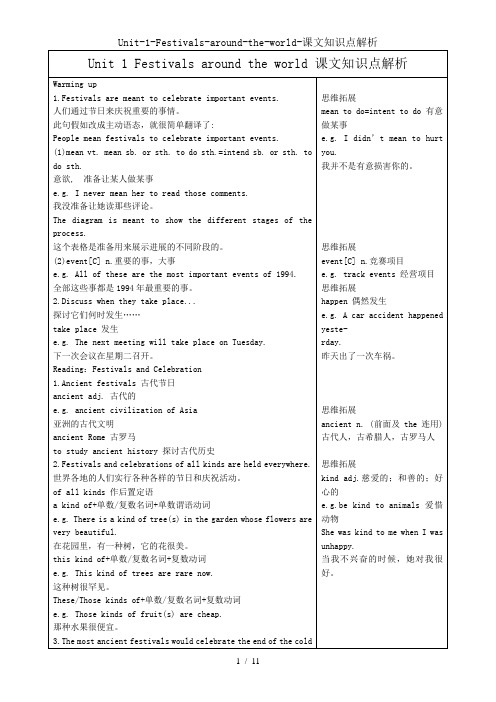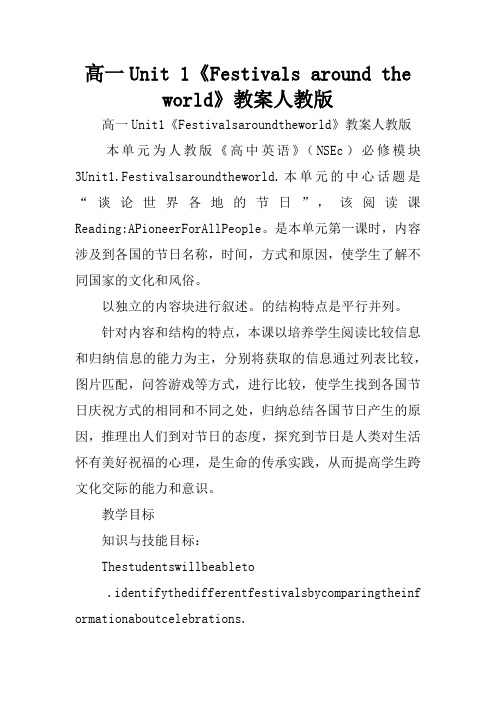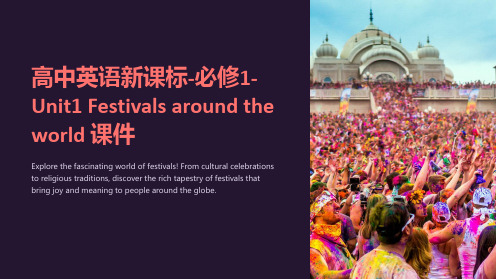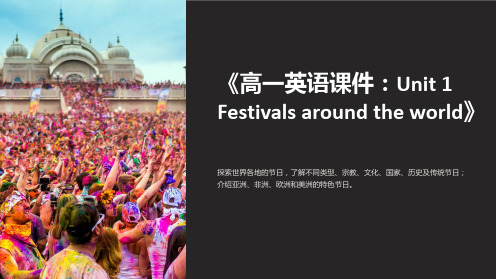英语:Unit1《Festivals around the world》warming up公开课课件
Unit-1-Festivals-around-the-world-课文知识点解析1

7....when people should go to clean the graves and light incense in memory of their ancestors.
……这时候,人们去扫墓,点上香火祭祀祖先。
memory[ C usually plura] n. 表示所记住的事情,记忆
starve vt.&vi. 挨饿,饿死
e.g. Thousands of people will starve if food doesn’t reach the stricken city.
假如食物无法到达这座受灾的城市,成千上万的人将会饿死。
5.They lit fire and made music because they thought these festivals would bring a year of plenty.
他们把食物, 鲜花和礼物献给死者。
offer sth. to sb.= offer sb.sth.供应某物给某人
e.g. He offered me 300 dollars for that television.
他出300美元向我买那部电视机。
12.The festival of Halloween had its origin as an event in memory of the dead.
万圣节起源于纪念已逝的人们。
had its origin as an event 起源于某事
have your or its origin=begin 开始
e.g.Many of the problems had their origin in post-war Europe.
高一Unit 1《Festivals around the world》教案人教版

高一Unit 1《Festivals around theworld》教案人教版高一Unit1《Festivalsaroundtheworld》教案人教版本单元为人教版《高中英语》(NSEc)必修模块3Unit1.Festivalsaroundtheworld.本单元的中心话题是“谈论世界各地的节日”,该阅读课Reading:APioneerForAllPeople。
是本单元第一课时,内容涉及到各国的节日名称,时间,方式和原因,使学生了解不同国家的文化和风俗。
以独立的内容块进行叙述。
的结构特点是平行并列。
针对内容和结构的特点,本课以培养学生阅读比较信息和归纳信息的能力为主,分别将获取的信息通过列表比较,图片匹配,问答游戏等方式,进行比较,使学生找到各国节日庆祝方式的相同和不同之处,归纳总结各国节日产生的原因,推理出人们到对节日的态度,探究到节日是人类对生活怀有美好祝福的心理,是生命的传承实践,从而提高学生跨文化交际的能力和意识。
教学目标知识与技能目标:Thestudentswillbeableto.identifythedifferentfestivalsbycomparingtheinf ormationaboutcelebrations.2.explainthereasonwhythefestivalscomeintobeingbyfin dingoutthesimilaritiesanddifferences.3.describetheirfavoritefestivalsbyusingthelanguagef romthetext.教学重点和难点)为全体学生进行有效性阅读策略的指导,包括语篇分析、猜测词义,逻辑推理、归纳概括等技巧。
2)通过比较信息,归纳总结各国节日产生的原因,推理出人们到对节日的态度和节日的意义。
教学过程教学步骤教学活动设计意图Pre-reading:Step1.Brainstorm:motivatetheSsbyaskingsomequestions.Q1:Doyouanyfestivalsaroundtheworld?Step2.matchthecelebrationwiththefestivals.Q2:DoyouknowhowpeoplecelebratetheseFestivals?Doaquiz.Step2.DiscussionSsdiscussthefollowingquestionsQ1:Howdotheycomeintobeing?Q2:whatdotheyhaveincommon?Andwhataretheredifference amongthem?问题引发了学生的思考,调动学生的已知,将学生的思维活动引导到课文主题上来。
英语:Unit1《Festivals around the world》warming up公开课课件

Read the following descriptions about western festivals and guess which festival they tell?
It is one of the most important festivals in western countries.
• The beauty of the full moon,harvest, time with family and friends
• Admire the moon and eat moon cakes
Dragon Boat Festival
On the 5th day of May lunar month
The founding of the People’s Republic of China in 1949
What festivals of foreign countries do you know?
Valentine’s Day
Fool’s Day
Easter
Halloween Christmas
Turkey is the most important food on this day. People celebrate it to thank God for a harvest in 1620.
Time: the fourth Thursday in November
parades
Read the following descriptions about western festivals and guess which festival they tell? This festival happens in spring. On this day most people are happy. Some people may be fooled but they can not be angry. People can tell lies and play tricks on others without being blamed.
高中英语 Unit1《Festivals around the world》课件 新人教版必修3

Part 2 What are festivals of the dead for?
They are to honour our ancestors / to make our ancestors happy so they won’t harm us / to satisfy our ancestors
Obon
in Japan
The Day of the Dead
InMexico
Pumpkin head
Halloween
The night of October 31st, when it was believed that the spirits of dead people appeared, and which is now celebrated in the US by children, who dress as witches and ghosts.
Festivals
❖ Foreign Festivals ❖ Christmas Day ❖ Thanksgiving Day ❖ Mother’s Day ❖ Father’s Day ❖ April Fool’s Day ❖ Valentine’s Day ❖ Easter ❖ Halloween
《高中英语新课标-必修1-Unit1 Festivals around the world 课件》

不同国家和文化中的节日
了解世界各国和不同文化中的庆典与节日,体验不同人群庆祝节日的方式, 感受文化的多样性与人类共同的欢庆。
节日的文化意义
探究节日在不同文化中的重要地位,了解它们对于文化传统、身份认同和价 值观的深远影响。
节日的历史渊源
追寻节日的历史根源,了解节日与人类历史和传统之间的联系,以及随着时 间推移如何演变和发展。
宗教节日及其意义
探索各大宗教中的重要节日,了解它们在信仰和宗教-必修1Unit1 Festivals around the world 课件
Explore the fascinating world of festivals! From cultural celebrations to religious traditions, discover the rich tapestry of festivals that bring joy and meaning to people around the globe.
为什么庆祝节日?
了解不同文化中庆祝节日的原因,从人们的欢乐和团结之中体会为什么庆祝节日的重要性。
世界各地不同类型的节日
探索世界各地独特的节日,从传统文化节日到现代庆典,领略各种不同类型 的节日给人们带来的喜悦与意义。
节日 - 生活的庆祝
了解节日作为人们庆祝与享受生活的方式,体验节日带来的喜庆氛围与人们 团聚的温暖。
《高一英语课件:Unit1Festivalsaroundtheworld》

4 Historical Festivals
Reenacting or remembering historical events or periods.
Festivals aroundthe world
1
China: Spring Festival
Experience the awe-inspiring
Holi
Join the fun-filled festivities of colors, water balloons, and joyous dances during the Festival of Spring.
Raksha Bandhan
Experience the bond of love and protection between brothers and sisters through tying of rakhi.
2 ReligiousFestivals
Observing and honoring religious beliefs and significant events.
3 National Festivals
Commemorating national achievements, independence, or important historical moments.
Reasons for Celebrating Festivals
1 CulturalPreservation
Preserve and pass down cultural traditions, customs, and rituals to future generations.
2 Community Bonding
《高一英语课件:Unit1Festivalsaroundtheworld》

Dragon Boat Festival
Racing Tradition
This lively festival features exciting dragon boat races, where teams paddle in synchronized harmony.
Delicious Dumplings
Festivals are not just celebrations; they are an integral part of cultural identity, promoting joy, unity, and respect for traditions. They bring communities together, fostering a sense of belonging and preserving heritage for future generations.
Mooncakes, with their various fillings, represent unity, harmony, and sharing blessings.
3
Lantern Displays
Elaborately crafted lanterns light up the night, creating a magical atmosphere of joy and wonder.
Enjoying outdoor activities and appreciating chrysanthemums are common traditions during Double Ninth Festival.
3 AuspiciousGifts
Gifting chrysanthemum-themed items symbolizes health, longevity, and wards off evil spirits.
高中英语 Unit 1 Festivals around the world Period 1 Wa

Unit 1 Festivals around the world单元要览类别课程标准要求掌握的项目话题Festivals; how festivals begin; how to celebrate festivals词汇beauty n. 美; 美人award n. 奖; 奖品vt. 授予harvest n. & vt. & vi. 收获; 收割rooster n. 雄鸡; 公鸡celebration n. 庆祝; 祝贺admire vt. 赞美; 钦佩; 羡慕starve vt. & vi. (使)饿死; 饿得要死energeticadj. 充满活力的; 积极的origin n. 起源; 由来; 起因custom n. 习惯; 风俗religious adj. 虔诚的; 宗教上的clothing n. 衣服ancestor n. 祖先; 祖宗worldwideadj. 遍及全世界的feast n. 节日; 盛宴permissionn. 许可; 允许belief n. 信任; 信心; 信仰fool n. 愚人vt. 愚弄vi. 干傻事trick n. 诡计; 恶作剧; 窍门apologizevi. 道歉; 辩白arrival n. 到来; 到达; 到达者drown vt. & vi. 溺死; 淹死gain vt. 得到; 获得obvious adj. 明显的; 显而易见的independencen. 独立; 自主remind vt. 提醒; 使想起gather vt. , vi. & n. 集合;聚集weep n. 哭vi. 哭泣; 流泪agriculture n. 农业; 农艺; 农学forgive vt. 原谅; 饶恕短语take place发生turn up出现; 到场in memory of纪念; 追念keep one’s word守信用; 履行诺言dress up盛装; 打扮; 装饰hold one’s breath屏息; 屏气play a trick on搞恶作剧; 诈骗; 开玩笑set off出发; 动身; 使爆炸look forward to期待; 期望; 盼望remind. . . of. . . 使……想起……day and night日夜; 昼夜; 整天be proud of以……而自豪as though好像in the shape of以/呈现……的形式/形状have fun with玩得开心be covered with被……所覆盖重要句型1. . . . people would starve if food was difficult to find. (the subjunctive mood)2. The country, covered with cherry tree flowers, looks as though it iscovered with pink snow. (as though. . . )3. Finding that. . . , her grandmother finally decided. . . (the presentparticiple used as adverbial. )4. It was obvious that the manager of the coffee shop was waiting. . .(It is+adj. +that. . . )5. “. . . I don’t want them to remind me of her. ” So he did. (So+S.+do/does/did. )6. There was Hu Jin waving at him and calling, . . . (Inversion)功能 1. Making phone callsMay I speak to. . . ?Can I ring/call back later?Hold/Hang on, please.I’ll ring him/her up again.Just a moment, please.Sorry, he/she isn’t here right now.2. InvitationsI wonder if you are interested in. . . .I’d like to invite you to. . . .Would you like. . . ?Could/Would you please. . . ?I’m looking forward to. . . .I’d love to, but. . . .3. ThanksThank you so much.Thanks a lot.That’s very kind of you.You’re most welcome.Don’t mention it.It’s a pleasure.语法The use of can, could, may, might, will, would, shall, should, must, can’t1. can and couldJin can speak English well. (ability)Could you please show me the way to Beihai Park? (request)2. may and mightMay we see the awards for the teams? (permission; request)She might give you some new clothing. (possibility)3. will and wouldThe Spring Festival is the most fun. The whole family will come for dinner.(promise; agreement)Often he would dress up like a rich man. (past habit; custom)4. shall and shouldThe harvest festival begins on Sunday. We shall be there with our friends.(promise; agreement)You should arrive at the airport two hours before he goes. (advice)5. must and can’tWang Feng wins an award every year. He must be very strong. (speculation) You must be joking. That can’t be true. (guessing)教学重点1. Get students to know about festivals around the world.2. Have students learn some useful new words and expressions about festivals and customs and let them learn effective ways to remember English vocabulary.3. Enable students to grasp and use the expressions of request and thanks.4. Let students learn the new grammar item: the use of can, could, may, might, will, would, shall, should, must and can’t.5. Develop students’ listening, speaking, reading and writing abilities.教学难点1. Enable students to master the use of can, could, may, might, will, would, shall, should, must and can’t.2. Let students learn to write a different ending of a story.3. Develop students’ integrative skills.课时安排Periods needed: 7Period 1 Warming up and readingPeriod 2 Learning about language: Important language points Period 3 Learning about language: GrammarPeriod 4 Using language: Listening and speakingPeriod 5 Using language: Extensive readingPeriod 6 Using language: Speaking and writingPeriod 7 Revision: Summing up and learning tipPeriod 1 Warming up and reading整体设计教材分析This is the first teaching period of this unit. At the beginning of the class, the teacher can lead in the topic of the unit by having a free talk with students about their winter holidays and the Spring Festival.The Warming Up is intended to have students start thinking about the variety of events and festivals that are celebrated in China, and connect them with seasons of the year and reasons for the celebrations. The teacher can use this part to introdu ce information that Chinese students should have about their country’s cultural events.The Pre-reading is a continuation of the Warming Up and it moves the discussion to a more personal level. It is intended to help students enter imaginatively into a discussion of festivals and their importance to the society. It also directs their attention to the variety of events and activities those festivals include. The teacher should let students discuss the questions and predict what kind of information will be introduced in the Reading.The reading passage titled FESTIVALS AND CELEBRATIONS briefly describes the earliest kinds of festivals with the reasons for them, and then four different kindsof festivals that occur in most parts of the world. Encourage students to look at the pictures and the heading of each section to guess what the text might be about. Then let them skim for the general idea for each section, and scan for further understanding. Because this passage introduces a lot of useful new words and expressions which are only used for festivals, in order not to let students feel much difficult, the teacher should deal with any language problems while they are reading. After reading, students are required to do the four exercises in the Comprehending to see how much they have understood the reading passage. The teacher can first let them work in pairs or in groups to find the answers cooperatively, and then check their answers with the whole class.To consolidate the contents of the reading passage, students should be required to talk about festivals in their own words at the end of the class. In order to arouse students’ interest, the teacher can hold a competition between groups.教学重点1. Let students learn more about history and basic knowledge of festivals.2. Get students to learn different reading skills.教学难点1. Develop students’ reading ability.2. Enable students to talk about festivals and celebrations.三维目标知识目标1. Get students to learn the useful new words and expressions in this part: beauty, harvest, starve, origin, religious, ancestor, Mexico, feast, bone, belief, poet, arrival, gain, independence, gather, agriculture, award, rooster, admire, energetic, Easter, clothing, Christian, custom, take place, in memory of, dress up, play a trick on, look forward to, day and night, as though, have fun with2. Let students learn about history and basic knowledge of festivals both in and out of China.能力目标1. Develop students’ reading ability and let them learn different reading skills.2. Enable students to talk about festivals and celebrations.情感目标1. Stimulate students’ love for their own national culture and customs.2. Develop students’ sense of cooperative learning.教学过程设计方案(一)→Step 1 Leading-inHave a free talk with students. Ask them the following questions:Did you have a good time in your winter holidays?When did you feel most happy and excited? Why?(At the Spring Festival. Because it’s the most important festival in ourcountry. . . )→Step 2 Warming up1. Let students brainstorm the other Chinese festivals.(Lantern Festival, Pure Brightness Festival, Dragon Boat Festival, Mid-Autumn Festival, New Year’s Day, Chung Yeung Festival. . . )2. Let students read the information about Chinese festivals below and discuss another three Chinese festivals:When does the festival come?What do people celebrate?What do people do?Festivals Date Festivals DateNew Year January 1st Teachers’ Day September 10th InternationalWomen’s DayMarch 8th National Day October 1stArbor Day March 12th The Spring Festival Lunar New YearInternational Labor Day May 1st Dragon BoatFestivalthe fifth day of the fifthlunar monthInternational Children’s Day June 1st Mid-AutumnFestivalthe 15th day of the 8thlunar monthArmy Day August 1st Lantern Festival the 15th day of the 1stlunar monthChinese Youth Day May 4th Pure Brightness Day April the fifth3. Ask students to fill in the following form and ask some to share their opinions with the whole class. The first one is given as an example.Festivals Time of year/date What it celebrates What people doMid-Autumn Festival autumn/fall the beauty of thefull moon, harvest,time with familyand friendsgive/eat moon cakesand watch the fullmoon with familyand friends4. Talk about some foreign festivals with students.(Christmas, April Fools’ Day, Easter, Halloween, Valentine’s Day, Thanksgiving Day, . . . )→Step 3 Pre-reading1. Let students discuss the following questions:What festivals or celebrations do you have in your city or town? What part of a festival do you like best—the activities, the music, the sights, the food or the people who visit?2. Ask students to look at the pictures and title of the passage in Reading. Discuss in pairs what kind of information will be introduced in the passage.→Step 4 Reading1. Fast readingAsk students to skim the reading passage and then fill in the following chart.Kinds of Festivals Names of Festivals Countries FestivalsFestivalsHarvestSpring(Let students look through the chart and then read the text silently. Three minutes later, check the answers with the whole class. Show the suggested answers on the screen. )2. Intensive readingAllow students to read carefully this time to understand the main ideas of each paragraph and the important details, and then finish the following:1)Choose the best answer to each question or to finish each sentence according to the text.(1)Why do Japanese people light lamps during the Festival of the Dead?A. Because they want to make the festival colorful.B. Because they want to light up their rooms.C. Because they want to light up their way.D. Because they want to lead their ancestors to return to earth.(2)Which of the following was not mentioned as a famous person in the text?A. Mohandas Gandi.B. Christopher Columbus.C. Abraham Lincoln.D. Qu Yuan.(3)The place where people will usually decorate churches and town halls with flowers and fruits is ______________.A. IndiaB. AmericaC. EuropeD. China(4)Easter is held in memory of the return of Jesus for Christians and also celebrates ______________.A. the coming of springB. the autumn harvestC. the Lunar New YearD. the end of a yearSuggested answers: (1)D (2)C (3)C (4)A2)Use the information from the reading passage to answer the following questions.(1)What are festivals of the dead usually for?(2)What makes autumn festivals happy events?(3)What do people usually do at spring festivals?(4)What is one important reason to have festivals and celebrations?(5)Compare the festivals of the dead in Mexico, Japan and China. What things are similar? What things are different?3. Reading and discussionRead the text a third time and then work in pairs to do the following.1)Based on the reading passage, what do most festivals seem to have in common? Why do you think these things might be important to people everywhere? Talk with your partner and fill in the chart below.Three common things Reasons why they are important to people everywhere1.2.3.2)Discuss in pairs which festivals you think are the most important and which are the most fun. Then fill in the chart with your ideas.Type of festival Example of festival Reasons for yourchoiceMost importantMost fun(Let students have enough time to read the passage carefully and discuss the questions and charts with their partners. Encourage them to expand their answers according to their own experiences. )4. ExplanationHelp students analyze some difficult, long and complex sentences and guess the meanings of some new words. Encourage them to try to deal with the language points in the context.Discuss the following important sentences and phrases in the passage.1)Some festivals are held to honour the dead, or to satisfy the ancestors, who might return either to help or to do harm.2)in memory of3)India has a national festival on October 2 to honour Mohandas Gandhi, the leader who helped gain India’s independence from Britain.4)People are grateful because their food is gathered for the winter and the agricultural work is over.5)The most energetic and important festivals are the ones that look forward to the end of winter and to the coming of spring.6)The country, covered with cherry tree flowers, looks as though it is covered with pink snow.Suggested explanations:1)The sentence contains a non-restrictive attributive clause who might return either to help or to do harm. It means people hold some festivals either to show respect to the dead or to make their ancestors happy in case they might come back to do harm.2)in memory of: serving to recall sb. , to keep him fresh in people’s mindsHe wrote a poem in memory of his dearest wife, who died in an accident.in honor of: showing great respect or high public regard3)the leader who helped gain India’s independence from Britain: a noun phrase followed by an attributive clause as the appositive4)two clauses for reason5)energy n. → energetic adj. : full of or done with energylook forward to: “to” is a preposition here.I’m looking forward to hearing from you.be devoted to; be/get used to; get down to; stick to. . .6)covered with cherry tree flowers: a past participle phrase equal to “which is covered with cherry tree flowers”as though: as ifHe talks as though he knew all about it.He looks as if he had seen a ghost.5. Reading aloud and underliningAsk students to read the passage aloud to the tape and let them pay attention to the pronunciation of each new word and the pauses within each sentence. Tell them to pick out all the useful expressions or collocations from the passage while reading and copy them to the notebook after class as homework.→Step 5 ConsolidationAsk students to talk about festivals in their own words according to the text. Then let them complete the following passage with proper words or phrases.There are all kinds of festivals and ______________ around the world, which are held for different ______________. The ancient festivals were mainly held at three times a year—the end of the cold ______________, planting in spring and ______________ in autumn. Some festivals are held to ______________ the dead or ______________ the ancestors, who might return either to help or ______________, while other festivals are held to honor famous people or to the ______________, such as Dragon Boat Festival, Columbus Day, and so on. Harvest and ______________ festivals are happy events because their food is ______________ for the winter and the ______________ work is over, to which Mid Autumn Festival belongs. And the most ______________ and important festivals are the ones that ______________ the end of winter and to the coming of ______________ such as the Lunar New Year, at which people have a very ______________.Suggested answers: celebrations; reasons; weather; harvest; honor; to satisfy; to do harm; gods; Thanksgiving; gathered; agricultural; energetic; look forward to; spring; good time→Step 6 Homework1. Learn the useful new words and expressions in this part by heart.2. Read the reading passage again and again and try to talk about festivals both in and out of China.设计方案(二)→Step 1 Leading in the topic by learning vocabulary about festivals1. Make a circle on the blackboard and write the word “FESTIVAL” in it.2. Ask students, “We have learned ‘festival’. Can you name some festivals? ”3. Students list as many festivals as possible. Then the teacher adds somestudents can’t think of, such as Halloween, Easter, Thanksgiving, Valentine’s Day.4. Let students read them aloud and try to learn them by heart.→Step 2 Warming up by talking about festivalsWork in groups and list three more Chinese festivals that you know. Discuss when they take place, what they celebrate and what people do at that time. Then tell the group which festival is their favorite and why.Festivals Time of year/date What it celebrates What people doMid-Autumn Festival autumn/fall the beauty of thefull moon, harvest,time with familyand friendsgive/eat moon cakesand watch the fullmoon with familyand friends→Step 3 Predicting by looking and discussing1. Look at the pictures and title of the reading passage and discuss in pairs what the passage might be about.2. Two or three students are to give their opinions.→Step 4 Reading1. Give students 2 minutes, and ask them to skim the passage for information to tell if the following sentences are True or False.1)The ancient people needn’t worry about their food. (F)2)Halloween used to be a festival intended to honor the dead. (T)3)Qu Yuan was a great poet who people honor a lot in China. (T)4)The Mid-autumn Festival is held to celebrate the end of autumn. (F)5)Easter celebrates the birth of Jesus. (F)2. Give students 5 minutes to read the passage carefully, and complete the chart according to the passage.Festivals of the Dead Obon in Japan___________________HalloweenFestivals to Honor People ________________________________A national festival in____________ Harvest Festivals _________ in European countries_________ in China and Japan Spring Festivals ________________Carnivals in some Western countries________________________________ in Japan3. Listening and reading aloudPlay the tape of the text for students and let them pay attention to the pronunciation of each new word and the pauses within each sentence. Then ask them to read the text aloud to the tape.→Step 5 Closing down by spoken practice1. Have students get prepared in 3 minutes or so and then ask them to talk about festivals and celebrations.2. Ask as many students as possible to have a try in front of the class.→Step 6 Homework1. Go over the text and try to learn all the useful words and expressions in this part by heart.2. Finish the exercises in Comprehending on Page3.板书设计Unit 1 Festivals around the worldFestivals and celebrationsKinds of Festivals Names of Festivals Countries FestivalsFestivalsHarvestSpring活动与探究Group discussion & speechAs is known from the reading passage, festivals of all kinds are celebrated around the world. Most festivals have celebrations that include food, music, clothing and dances. These events originated from some similar ideas, but they take different forms in different regions and societies. What festivals and celebrations do you know all over the world? Have you ever taken part in them and enjoyed yourself? Discuss festivals in groups and then make speeches.Step 1: The teacher divides the class into four groups and gives the tasks to students in each group. Group 1 will list the festivals around the world as many as possible, and then categorize them according to the origins of these festivals. And they should prepare for a short speech. Group 2 will discuss two traditional Chinese festivals and prepare for their presentation. Group 3 will discuss two Western festivals and prepare for their presentation. Group 4 will discuss the differences between Chinese festivals and Western festivals, then contrast and compare their styles, celebrations, dates and so on. And they should prepare for a short speech.Step 2: Groups 1, 2 and 3 give their speeches on the festivals they have discussed. Group 4 gives their speech on the differences between Chinese festivals and Western festivals.Step 3: The teacher makes proper remarks about students’ speeches and sums up the different cultural practices between China and other countries according to them.。
- 1、下载文档前请自行甄别文档内容的完整性,平台不提供额外的编辑、内容补充、找答案等附加服务。
- 2、"仅部分预览"的文档,不可在线预览部分如存在完整性等问题,可反馈申请退款(可完整预览的文档不适用该条件!)。
- 3、如文档侵犯您的权益,请联系客服反馈,我们会尽快为您处理(人工客服工作时间:9:00-18:30)。
• The Spring Festival may take place in February. It is on lunar 1st of January.
• At the Spring Festival, people have plenty of food and fruit, and may give children lucky money in red paper.
恭喜发 财! 红包 拿来!
Greet each other
• watch the Spring Featival Gala /programme
have the family dinner
watch fireworks
Do you know the food in the Spring
Festival?
Dumplings
It means in Chinese the beginning of the new
year.
年年有余: Having more than need every year
吉祥如意: Everything goes well. Be good! / All the best.
• In memory of the beloved poet QuYuan who died in 278 BC
• Eat rice dumplings/ zongzi and watch dragon boat races
day to the
fifteenth day of the
first lunar month.
Why?
Demon Nian
In ancient time, a demon(怪物) called “Nian” that lived under the sea world hurt people once a year on the new year eve.
What?
Write and paste couplets on doors
Set off firecracks
It is said that the evil spirits can be frightened
to run away.
Receive Gift Money
Children get money in red paper or envelop from their parents or relatives.
Spring Festival
• Spring Festival is the traditional
when
Chinese New Year’sபைடு நூலகம்
Day. It usually falls
in early February.
And the celebration
lasts from the first
Time: The fifteenth day of the first lunar month
Lantern show
Lion dancing
Guessing riddles
Dumpling ball
Mid-autumn Festival
• Time: on the 15th day of August lunar month
Lantern Festival
on the fifteenth day of the new year ( 15th, in the lunar calendar)
lanterns: symbols of good fortune, happiness and health.
“dragon” and “lion ” dances
• The beauty of the full moon,harvest, time with family and friends
• Admire the moon and eat moon cakes
Dragon Boat Festival
On the 5th day of May lunar month
Origin
The villagers gathered to discuss how to deal with “Nian” .Some people said that the demon was afraid of loud noises, red color and flames.
Origin
• People studying or working in other cities and countries will look forward to seeing their relatives and friends, so that they will come back and have fun with them.
So they lighted firecrackers, put on red couplets on their gates, beat gongs (锣)and drums to drive “Nian” away. Since then, the custom and tradition of celebrating the Spring Festival were born.
• People ,especially children ,will dress up during the Spring Festival.
• On New Year’s Eve, people will have a dinner , watch the Spring Festival programme\Gala, watch fireworks, set off firecrackers
Lantern Festival
New Year’s Day
Women’s Day
National Day
Chinese festivals
May Day
and holidays
Army Day
Children’s Day
Mid-autumn Festival Dragon Boat Festival Qiqiao Festival
